Request Demo
Last update 08 May 2025
CSPG4 x Chondroitin sulfate proteoglycans
Last update 08 May 2025
Basic Info
Related Targets |
Related
1
Drugs associated with CSPG4 x Chondroitin sulfate proteoglycansMechanism CSPG4 gene modulators [+1] |
Active Org. |
Originator Org. |
Active Indication |
Inactive Indication- |
Drug Highest PhasePreclinical |
First Approval Ctry. / Loc.- |
First Approval Date20 Jan 1800 |
100 Clinical Results associated with CSPG4 x Chondroitin sulfate proteoglycans
Login to view more data
100 Translational Medicine associated with CSPG4 x Chondroitin sulfate proteoglycans
Login to view more data
0 Patents (Medical) associated with CSPG4 x Chondroitin sulfate proteoglycans
Login to view more data
25
Literatures (Medical) associated with CSPG4 x Chondroitin sulfate proteoglycans01 Nov 2023·Journal of Alzheimer's Disease Reports
Increased Cerebral Serum Amyloid A2 and Parameters of Oxidation in Arylsulfatase B (N-Acetylgalactosamine-4-Sulfatase)-Null Mice
Article
Author: Tobacman, Joanne K. ; Bhattacharyya, Sumit
01 Jan 2020·Advances in Experimental Medicine and BiologyQ4 · MEDICINE
Chondroitin Sulphate Proteoglycans in the Tumour Microenvironment
Q4 · MEDICINE
Review
Author: Casalone, Cristina ; Favole, Alessandra ; Boldorini, Renzo ; Cassoni, Paola ; Corona, Cristiano ; Schiffer, Davide ; Crociara, Paola ; Mellai, Marta
01 Aug 2019·The FEBS JournalQ3 · BIOLOGY
Proteoglycans and glycosaminoglycans as regulators of cancer stem cell function and therapeutic resistance
Q3 · BIOLOGY
Review
Author: Alaniz, Laura ; Greve, Burkhard ; Götte, Martin ; Vitale, Daiana ; Kumar Katakam, Sampath ; Jang, Bohee ; Oh, Eok‐Soo
Analysis
Perform a panoramic analysis of this field.
login
or

AI Agents Built for Biopharma Breakthroughs
Accelerate discovery. Empower decisions. Transform outcomes.
Get started for free today!
Accelerate Strategic R&D decision making with Synapse, PatSnap’s AI-powered Connected Innovation Intelligence Platform Built for Life Sciences Professionals.
Start your data trial now!
Synapse data is also accessible to external entities via APIs or data packages. Empower better decisions with the latest in pharmaceutical intelligence.
Bio
Bio Sequences Search & Analysis
Sign up for free
Chemical
Chemical Structures Search & Analysis
Sign up for free
